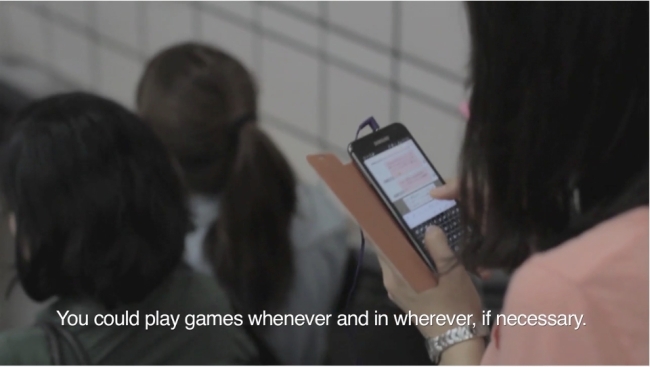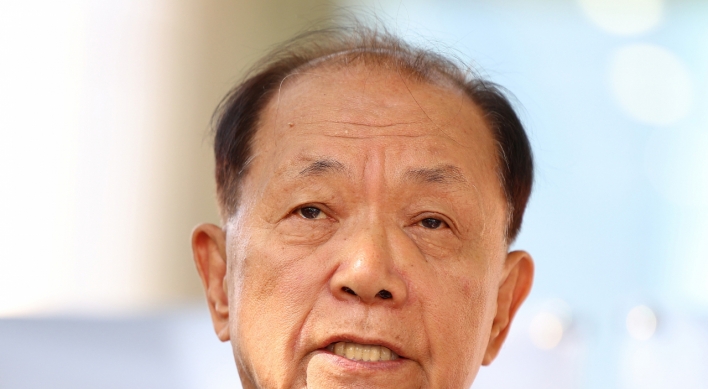‘Love Child’ to shed light on Korea’s ‘wired’ society at Sundance
American filmmaker Valerie Veatch talks high-tech Korean culture with new documentary
By Korea HeraldPublished : Dec. 19, 2013 - 19:28

As the world’s most wired nation, Korea is hard-pressed to adapt itself under the ever-so-rapidly progressing merger of the online and offline worlds. With one of the highest numbers of smartphone users and where online game rooms are on almost every corner, Korea has become one of the leading forces in global technology.
Valerie Veatch, an American director, writer, editor and producer, came to Korea for the first time in 2012 for the sole purpose of attempting to capture the extent of technology’s impact on Korean society and culture in a documentary film, “Love Child.” The independent film chronicles the societal impacts of the nation’s global push in technological advancement and the effects it has on the citizens. The documentary will have its world premiere at the Sundance Film Festival in the U.S. next month.
“The film follows the story of a highly advanced Korean IT infrastructure that was built to make Korea into a globally competitive economy,” said Veatch. “And in the wake of that mega climb, there now is a highly immersive, highly integrated virtual life that, for better or for worse, is beginning to immerse beyond the real world.”
“Love Child” is a joint Korea-U.S. film developed with first-time Korean producer Danny Kim, and marks Veatch’s second release after making her directorial debut at the 2012 Sundance Film festival with “Me @ The Zoo” ― a documentary about the life of Internet celebrity Chris Crocker.
“Love Child” touches on a number of anomalies blurring the line between the virtual and the real. It also follows the story of the Korean couple who was convicted of neglecting their newborn daughter who starved to death while they claimed to be addicted to an online game ― where the couple was, ironically, protecting a virtual child.
The story of the death of the newborn Sa-rang (which means “love” in Korean) in 2010 made international headlines, and immediately captured the attention of Veatch who was living in Rome at the time.
“I just couldn’t get this story out of my mind for a really long time,” said the director. “There’s something about the people in the story, I found it very profound. It felt like there was this moment in time where Korea was beginning to grapple with something that now, a few years later, seems so common.”
Although the film does highlight some negative aspects of those with an unhealthy reliance on electronic gadgets, Veatch’s intention for the documentary is not to condemn or oppose the spread of technology; rather, she simply hopes to shed light on technology’s tremendous influence on individuals.
“I’m a techno-Utopian by nature,” said the director, flashing her new Samsung smart watch in her LA apartment during her video interview with The Korea Herald.
“It seems ironic given the subject of the film, but I really enjoy building a film that redeems the whole endeavor because I believe in technology,” she went on to explain. “Although it’s a very particular story (the case of Sa-rang), it’s also kind of a fable. It’s more about where technology is going and how it’s shaping our society and in a lot of ways I think Korea represents the future of how society will organize around technology.”
In the international media coverage of the story, she noticed patriarchal, sharp judgment against baby Sa-rang’s mother over her mothering instincts.
“I think what’s interesting about this story is that the couple very much was loving their real-life baby and loving their online child. They just didn’t have enough,” said Veatch. “The technology provided enough social signifiers and emotional and mental stimuli that they did engage in that world. And that is unique to a very sophisticated and highly fast broadband infrastructure being developed in Korea.”
“It just stuck out as a story that felt emblematic of changes that are happening, and I wanted to give a voice to the gentler aspects of the story that could be seen in a more positive light,” she said.
The documentary was titled “Love Child” in memory of Sa-rang. After its premiere at Sundance, the director plans to release the film in Korea sometime next year.
By Julie Jackson (juliejackson@heraldcorp.com)
Valerie Veatch, an American director, writer, editor and producer, came to Korea for the first time in 2012 for the sole purpose of attempting to capture the extent of technology’s impact on Korean society and culture in a documentary film, “Love Child.” The independent film chronicles the societal impacts of the nation’s global push in technological advancement and the effects it has on the citizens. The documentary will have its world premiere at the Sundance Film Festival in the U.S. next month.
“The film follows the story of a highly advanced Korean IT infrastructure that was built to make Korea into a globally competitive economy,” said Veatch. “And in the wake of that mega climb, there now is a highly immersive, highly integrated virtual life that, for better or for worse, is beginning to immerse beyond the real world.”
“Love Child” is a joint Korea-U.S. film developed with first-time Korean producer Danny Kim, and marks Veatch’s second release after making her directorial debut at the 2012 Sundance Film festival with “Me @ The Zoo” ― a documentary about the life of Internet celebrity Chris Crocker.
“Love Child” touches on a number of anomalies blurring the line between the virtual and the real. It also follows the story of the Korean couple who was convicted of neglecting their newborn daughter who starved to death while they claimed to be addicted to an online game ― where the couple was, ironically, protecting a virtual child.
The story of the death of the newborn Sa-rang (which means “love” in Korean) in 2010 made international headlines, and immediately captured the attention of Veatch who was living in Rome at the time.
“I just couldn’t get this story out of my mind for a really long time,” said the director. “There’s something about the people in the story, I found it very profound. It felt like there was this moment in time where Korea was beginning to grapple with something that now, a few years later, seems so common.”
Although the film does highlight some negative aspects of those with an unhealthy reliance on electronic gadgets, Veatch’s intention for the documentary is not to condemn or oppose the spread of technology; rather, she simply hopes to shed light on technology’s tremendous influence on individuals.
“I’m a techno-Utopian by nature,” said the director, flashing her new Samsung smart watch in her LA apartment during her video interview with The Korea Herald.
“It seems ironic given the subject of the film, but I really enjoy building a film that redeems the whole endeavor because I believe in technology,” she went on to explain. “Although it’s a very particular story (the case of Sa-rang), it’s also kind of a fable. It’s more about where technology is going and how it’s shaping our society and in a lot of ways I think Korea represents the future of how society will organize around technology.”
In the international media coverage of the story, she noticed patriarchal, sharp judgment against baby Sa-rang’s mother over her mothering instincts.
“I think what’s interesting about this story is that the couple very much was loving their real-life baby and loving their online child. They just didn’t have enough,” said Veatch. “The technology provided enough social signifiers and emotional and mental stimuli that they did engage in that world. And that is unique to a very sophisticated and highly fast broadband infrastructure being developed in Korea.”
“It just stuck out as a story that felt emblematic of changes that are happening, and I wanted to give a voice to the gentler aspects of the story that could be seen in a more positive light,” she said.
The documentary was titled “Love Child” in memory of Sa-rang. After its premiere at Sundance, the director plans to release the film in Korea sometime next year.
By Julie Jackson (juliejackson@heraldcorp.com)
-
Articles by Korea Herald







![[KH Explains] No more 'Michael' at Kakao Games](http://res.heraldm.com/phpwas/restmb_idxmake.php?idx=644&simg=/content/image/2024/04/28/20240428050183_0.jpg&u=20240428180321)











![[Herald Interview] Mistakes turn into blessings in street performance, director says](http://res.heraldm.com/phpwas/restmb_idxmake.php?idx=652&simg=/content/image/2024/04/28/20240428050150_0.jpg&u=20240428174656)
